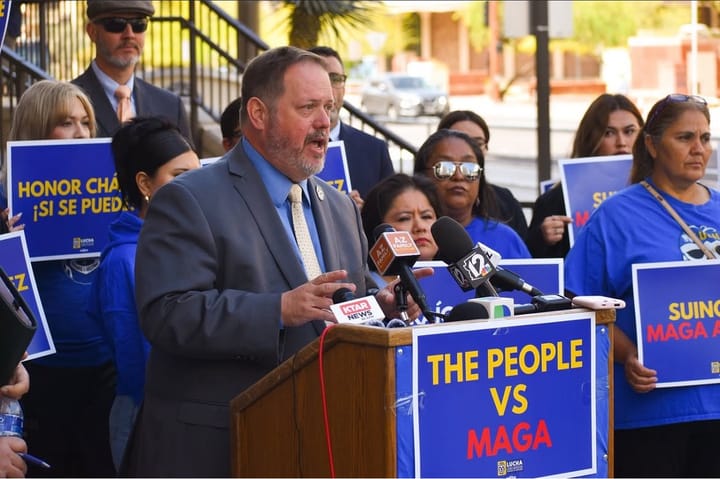Students and scholars unite to tackle Tucson’s housing crisis
Working in teams, the students conducted interviews, analyzed data, and created poster presentations which were displayed around the room and offered a snapshot of the struggles faced by Tucson’s low-income residents.

Dozens of University of Arizona students showcased their research and called on local leaders to take action during Tuesday’s 8th annual Community Forum on Housing and Poverty in Tucson.
In a packed room alive with conversation and community spirit, 44 students spent the morning presenting their findings from the semester, which saw them interview more than 350 Tucson residents facing economic instability.
Under the guidance of Professor Brian Mayer, the students explored the everyday struggles of individuals and families fighting to survive in a city where rents are soaring and wages are stagnant.
“On average, we saw a $200 rent increase from last year to this year for the people we interviewed,” Mayer told the crowd of nonprofit leaders, city officials, and advocates for housing reform during Tuesday’s event. “Many simply can’t make ends meet — they’re falling behind on rent, utilities, and basic needs. Food insecurity is a growing concern.”
Mayer describes the undergraduate sociology course as "amazingly hands-on,” saying it transforms students into researchers and advocates for social change.
Working in teams, the students conducted interviews, analyzed data, and created poster presentations which were displayed around the room and offered a snapshot of the struggles faced by Tucson’s low-income residents — while highlighting the human side of statistics.
"The waiting list for housing vouchers is some 20,000 people deep," Mayer said. "That’s a problem for our community, and we can’t ignore it."

Students were encouraged to bring the voices of those directly impacted by housing instability to the forefront. Each student interviewed at least eight people, their words providing a comprehensive view of both the hardships and the resilience within the community.
UA senior Madison Rutherford’s group focused on housing insecurity and identified significant barriers to accessing government services.
"There’s a lack of funding and outreach," Rutherford said. "People are forced to navigate confusing websites for services, which aren't available in their language or are too difficult for non-tech-savvy individuals to use."
Rutherford suggested potential solutions, including repealing the Arizona Residential Landlord Act and amending zoning ordinances to make housing more affordable.
"There needs to be more education opportunities to help people get better jobs and afford the rising prices," Rutherford said. "This experience has been so valuable, applying everything we've learned to real-life situations. I’m hoping to go into social work, and this has been crucial for my future."
Bella Burd, a junior, shared her group's research on neighborhood concerns, which highlighted issues like stress, safety, satisfaction, and social connectedness.
Their findings revealed that homelessness, drug activity, and speeding were the most pressing concerns, with Burd saying she was particularly surprised by how significant a concern speeding was. She noted that many residents emphasized the need for safer streets.
Her group found that those who felt more connected to their neighborhood were generally more satisfied.
"Interestingly, people without kids expressed more concerns about neighborhood safety for children than parents did," Burd said. "We suggested solutions like low-barrier shelters and street outreach for homelessness, as well as speed bumps and more stop signs to improve traffic safety."
Senior Alexia Boswell saidt her group's research on food insecurity revealed that 98% of highly food-insecure participants had to skip meals. Of those people, 73% were not using resources like food banks, with Boswell explaining that transportation was a major barrier. She also noted a gender gap in the use of the Supplemental Nutrition Assistance Program, with men less likely to utilize the service.
Increasing outreach to men could help address this issue, she said, adding that hearing people’s real stories provided her with a deeper understanding of food insecurity.
Nghishawn Nguyen, another senior, shared insights on how education impacts income and debt.
"We found that people with bachelor’s degrees earned significantly more than high school graduates," Nguyen said. "However, even with degrees, many still struggle to find good-paying jobs."
Nguyen’s group also uncovered some surprising insights about income and financial stability.
"Income doesn’t always correlate with financial stability. Some people making $30,000 to $40,000 a year were able to get by comfortably, while those making $80,000 to $90,000 still struggled with housing," Nguyen said. "We suggested job training and educational opportunities within the workplace to help people increase their earnings over time."
Mayer praised the project’s collaboration between Habitat for Humanity, the City of Tucson, and the UA, emphasizing the rarity and importance of such partnerships.
He said that together, they’re building a clearer picture of what needs to change in the community.
The forum was not just a space for identifying problems but also for generating solutions. Mayer urged attendees to use the research and personal stories shared by students to advocate for policy changes.
"These students have done the groundwork. They’ve spoken to people, analyzed the data, and presented solutions. Now, it’s up to us to turn those insights into policies and programs that work," he said. "We’re all here because we care about our community. The question is, what are we going to do next? Let’s use what we’ve learned today to make Tucson a place where everyone has the opportunity to thrive."
Angelina Maynes is a journalism major at the University of Arizona and reporter with Tucson Spotlight. Contact her at angelinamaynes@arizona.edu.
Tucson Spotlight is a community-based newsroom that provides paid opportunities for students and rising journalists in Southern Arizona. Please support our work with a paid subscription.




